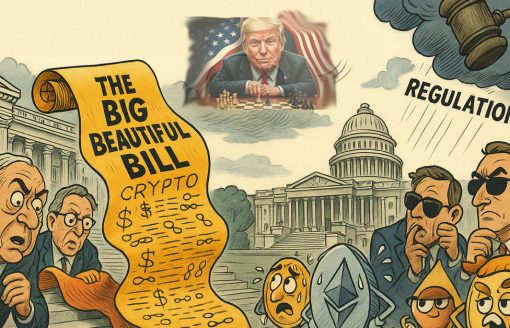By CryptoCaster Editorial Desk
A Forgotten Sector Wakes Up
Privacy coins — once the outlaws of crypto — are suddenly back in the conversation.
After years of regulatory chill and exchange delistings, names like Zcash, Monero, and Firo are posting higher volumes and renewed developer activity.
Stay in the know on crypto by frequently visiting Crypto News Today
Zcash is leading the charge. Its recent tech upgrades and a growing wave of privacy-conscious traders are putting it back on watchlists — not as a meme revival, but as a real statement about financial freedom in an era of total visibility.
Zcash Rewrites the Privacy Playbook
The Halo Arc 2.0 upgrade gave Zcash new life by dropping the old “trusted setup” model and adding faster, recursive zero-knowledge proofs. That might sound academic, but it’s a major deal: transactions can now be verified without revealing who sent what to whom.
Developers call it “proof without exposure.” Investors call it “sovereignty that works.”
Zcash is positioning itself between the extremes — privacy strong enough for the cypherpunks, yet transparent enough to satisfy modern DeFi rails. In a market hungry for compliant-optional anonymity, that middle path suddenly looks like smart positioning.
CryptoCaster Quick Check:
Monero, Firo, and the Shadow Network
While Zcash grabs headlines, Monero (XMR) remains the privacy heavyweight — its ring-signature tech still unmatched for full fungibility. Despite constant scrutiny, Monero’s network metrics keep climbing.
Then there’s Firo, the experimental sibling using Lelantus cryptography for total transaction concealment. And Secret Network (SCRT), which extends privacy beyond simple transfers into smart contracts and DeFi logic.
Individually, these projects target niche audiences. Together, they’re shaping a quiet but growing movement: the idea that crypto without privacy isn’t truly decentralized — it’s just surveillance on-chain.
Why the Momentum Now
Three big shifts explain why privacy tech is back on radar:
- Data exhaustion. Chain analytics now map wallets to real identities. Traders are tired of every move being traceable.
- Regulatory overreach. Central banks push programmable currencies; privacy networks answer with permissionless alternatives.
- Tech maturity. Zero-knowledge proofs and stealth-address systems have gone from theoretical to production-grade.
The combination is simple but powerful: investors are re-pricing discretion as a feature, not a flaw.
CryptoCaster View: The Market’s Counterweight
CryptoCaster’s take?
The privacy coin rebound isn’t nostalgia — it’s a natural market correction against over-transparency.
In traditional finance, banks protect client data by law. In DeFi, the code exposes everything. Privacy coins restore that balance.
They’re not trying to hide crime; they’re defending the idea that financial freedom includes the right not to be tracked.
Zcash and Monero are now two sides of the same argument:
- One offers selective disclosure (for exchanges, businesses, and compliance).
- The other offers full invisibility (for absolute self-custody).
Both remind us that decentralization without privacy is just decentralization under surveillance.
What to Watch Next
Privacy networks are quietly finding new footholds:
- DeFi bridges that support shielded transactions.
- Cross-chain swaps using zero-knowledge layers.
- Mobile wallets with built-in view keys for flexible transparency.
At the same time, regulators are re-examining how to handle anonymity without banning innovation. Expect more “privacy-optional” frameworks — and fierce debates about where freedom ends and oversight begins.
In other words: the conversation that regulators tried to end in 2020 is back, and this time the code is better prepared.
Bottom Line
Privacy coins are rallying because they represent something deeper than price action — a return to crypto’s founding promise.
Zcash might not reclaim its 2017 highs overnight, but its mission suddenly feels relevant again. When traders, institutions, and developers all start asking how to keep transactions theirs again, it’s clear:
Privacy isn’t a trend — it’s the feature that never went away.
If this article brought you clarity, insight, or value—support the work that made it possible.
At CryptoCaster, we report on Web3, crypto markets, and institutional finance with no billionaire owners, no shareholders, and no hidden agenda. While mainstream media bends toward Elon Musk, BlackRock, and JPMorgan narratives, we stay focused on what matters: truth, transparency, and the public interest.
We don’t just cover the headlines—we investigate the power structures behind them. From FTX and Ripple to the quiet push for CBDCs, we bring fearless reporting that isn’t filtered by corporate interests.
CryptoCaster is 100% paywall-free. Always has been. To keep it that way, we depend on readers like you.
If you believe independent crypto journalism matters, please contribute—starting at just $1 in Bitcoin or Ether. Wallet addresses are below.
Your support keeps us free, bold, and accountable to no one but you.
Thank you,
Kristin Steinbeck
Editor, CryptoCaster
Support CryptoCaster: The Unfolding of Money
At CryptoCaster.world, we’re dedicated to bold journalism, sharp insights, and fearless commentary across blockchain, Web3, and crypto markets. Your **Bitcoin contributions** help us stay independent and continue delivering signal over noise.
🚨 CryptoCaster does not offer investment advice. Always DYOR—volatility is real, and risk tolerance matters.
Support our mission. Contribute BTC today.
🔗 Bitcoin Address:
3NM7AAdxxaJ7jUhZ2nyfgcheWkrquvCzRm
Thank you for backing our journalistic lens as we chronicle the Unfolding of Money — a saga still being written in real time.![]()
CRYPTOCASTER HEATMAP








